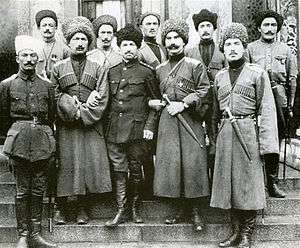Savage Division

The Caucasian Native Cavalry Division (Russian: Кавказская туземная конная дивизия), or 'Savage Division' (Russian: Дикая дивизия) was a cavalry division of the Imperial Russian Army, formed in 1914. It was composed of volunteers from Chechnya, Ingushetia, Karachay, Circassia, Kabarda, Azerbaijan, Dagestan and some from Ossetia, Armenia, Georgia, Abkhazia, Adjara. It took part in World War I, commanded by the Russian general, Grand Duke Mikhail Alexandrovich Romanov, brother of Tsar Nicholas II.[1]
During the Russian Revolution of 1917 the Savage Division remained loyal to the Russian Provisional Government. The division was disbanded in 1918.
The Kornilov affair
On the order of General Aleksandr Krymov, commander of the 3rd Cavalry Corps, the division commander General Dmitry Bagration and his officers reacted to a supposed insurgency by German agents in Petrograd by relocating from the war front to Petrograd during the Kornilov affair. However, Muslim delegates of the Petrograd Soviet, nominal members of the Russian Constituent Assembly, arrived at the Division directly from the capital and not only dispelled rumors of rebellion, but also demonstrated with documents that General Krymov himself was a rebel leading his troops against the government.
Among these delegates were some well-known Muslims, such as the grandson of Imam Shamil. For that reason, they were not arrested, a decision that went against Krymov's officers' wishes. Such an arrest would have been a violation of Chechen and Dagestani customs of hospitality. Unable to fulfill his order, division commander Krymov committed suicide.
The Savage Division was persuaded not to fight by fellow Caucasian Muslims, who were participating in a Soviet Congress in Petrograd at the time. They hoisted a red flag on which 'Land and Freedom' was written, arresting their commanders and sending a delegation to Petrograd to plead allegiance to the government.[2]
References
Bibliography
- Figes, Orlando (2014). A People's Tragedy: The Russian Revolution 1891–1924. London: The Bodley Head. ISBN 9781847922915.